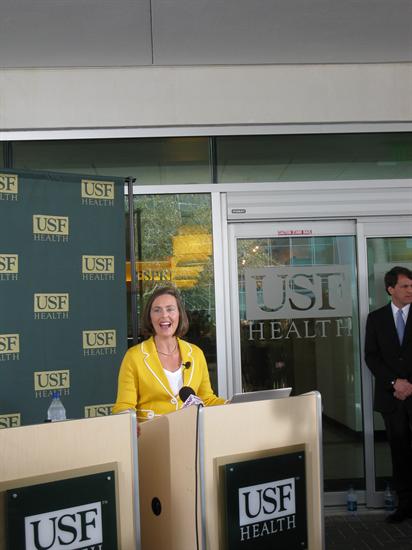Press Release
Castor Unveils New Electronic Healthcare Initiative
Tampa,
March 16, 2009
Congresswoman Kathy Castor said today that the University of South Florida’s initiative to bring electronic prescribing to the Tampa Bay area will bring much-needed and well-paying health care and information technology jobs to the region. “PaperFree Tampa Bay is exactly what was intended by the economic recovery plan,” Castor said. “It’s going to create the high-wage jobs of the future.” PaperFree Tampa Bay is a guaranteed job creator as intended by the Recovery Act, creating more than 130 in the Tampa Bay area.
TAMPA – Congresswoman Kathy Castor said today that the University of South Florida’s initiative to bring electronic prescribing to the Tampa Bay area will bring much-needed and well-paying health care and information technology jobs to the region.
“PaperFree Tampa Bay is exactly what was intended by the economic recovery plan,” Castor said. “It’s going to create the high-wage jobs of the future.”
PaperFree Tampa Bay is a guaranteed job creator as intended by the Recovery Act, creating more than 130 in the Tampa Bay area. These will be well-paying jobs, paying roughly $20-$25 an hour.
Castor unveiled the new, innovative health initiative today with College of Medicine Dean Dr. Stephen Klasko.
PaperFree Tampa Bay will directly help the thousands of doctors and their patients in the Tampa Bay community. Castor explained that USF plans to pull down money from the Recovery Act to fund this initiative in a 10-county region. The short-term goal is to convert all 10,000 doctors in the region to electronic prescribing. Electronic prescribing will help lay the foundation for the broader goal of transitioning to a completely electronic medical records system.
Castor serves on the House Energy and Commerce Committee, which drafted the health care portion of the Recovery Act. The Recovery Act includes $19 billion for health information technology initiatives. Castor said she will work proactively to bring the resources provided in the Recovery Act to the Tampa Bay area and USF.
“We have devoted $19 billion to computerizing medical records across the country,” Castor said. “This is the first region in the country that will call upon that money.”
Castor said the University of South Florida and the Tampa Bay area is the logical place to start electronic prescribing. USF Health includes the colleges of medicine, nursing and public health. The university shares a campus with the H. Lee Moffitt Cancer & Research Center and is across the street from the James A. Haley Veterans Administration Hospital, one of the busiest VA’s in the country.
“With USF’s leadership we’re going to be successful drawing down those dollars,” Castor said.
Castor looks forward to the positive benefits of electronic prescribing and noted that USF’s plan comes when President Obama and Congress are kicking off a larger health care reform effort. The goal of that effort is to improve the quality of health care while making it more affordable. Electronic prescribing will reduce medical records and provide an important foundation for health care reform, Castor said. |


